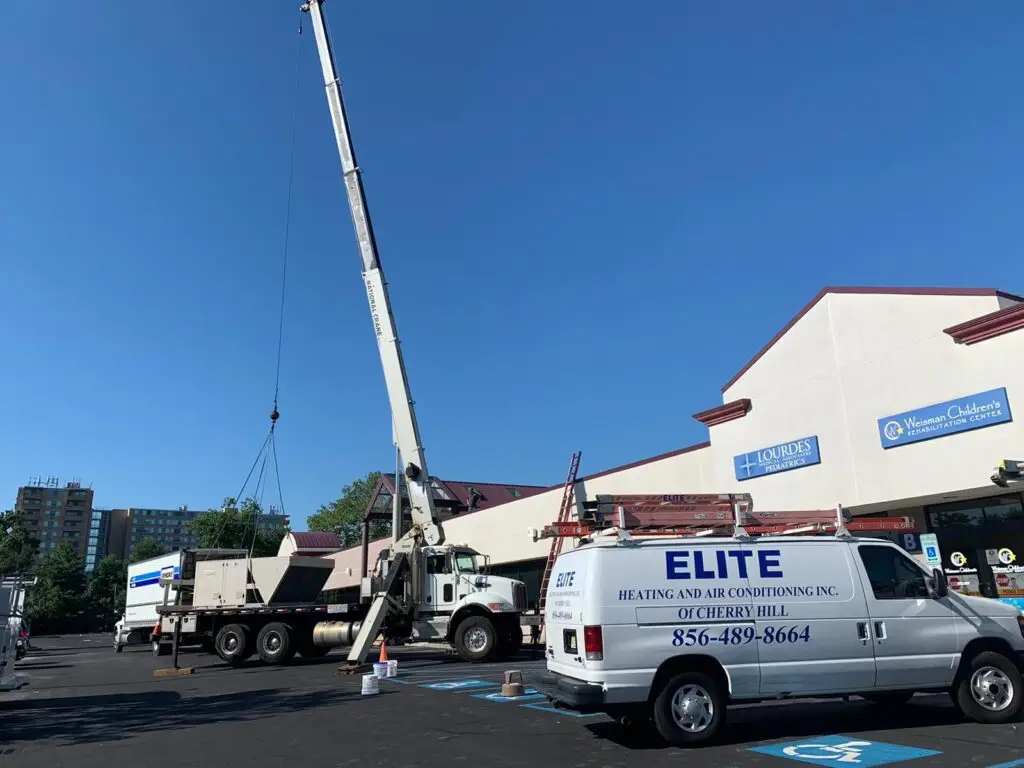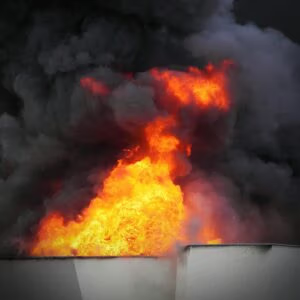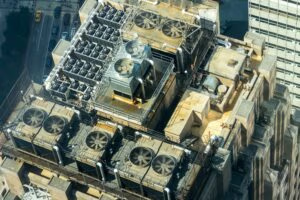Why Is My Commercial AC Blowing Air but Not Cold? Solutions for Businesses
When a commercial AC unit blows air that isn’t cool, it can lead to uncomfortable temperatures, frustrated employees, and lost productivity. Commercial HVAC systems are built to handle extensive cooling needs, so when they fail to deliver, the problem can often be complex. Here, we’ll look at common reasons why your commercial AC might blow warm air and how to address this issue.
1. Thermostat Setting Issues
In commercial spaces, the thermostat often controls large zones, so a minor error in settings can impact a substantial area. If the thermostat is set to “fan” rather than “cool,” the system will circulate air without cooling it.
- Quick Check: Double-check that the thermostat is set to “cool” and is at a reasonable temperature setting. Verify that it isn’t set to just circulate air.
- Professional Solution: If the thermostat is malfunctioning or displaying error codes, a professional can recalibrate or replace it. Commercial thermostats are complex, so having a certified technician check for wiring or sensor issues can save time and prevent further problems.
2. Refrigerant Issues
Refrigerant is critical for the cooling process, and low levels will prevent the AC from producing cool air. In large commercial systems, refrigerant leaks or low levels often go unnoticed until the system starts blowing warm air.
- Quick Check: Listen for hissing sounds near the AC unit, which may indicate a refrigerant leak. If you notice frost or ice forming on the AC unit, it’s also a sign of low refrigerant.
- Professional Solution: Only certified HVAC technicians should handle refrigerant. A technician can locate any leaks, repair them, and recharge the system to restore its cooling capacity. Regular refrigerant checks as part of maintenance can prevent these issues.
3. Dirty or Clogged Filters
In a commercial environment, air filters can quickly become clogged due to higher dust and debris levels, especially in industrial settings. Clogged filters restrict airflow, leading to inadequate cooling.
- Quick Check: Check filters for dirt or blockage. Replacing or cleaning filters can often resolve minor airflow issues, improving cooling performance.
- Professional Solution: An HVAC technician can clean or replace filters and perform a comprehensive inspection to ensure your system has sufficient airflow. Regular filter replacements are crucial in commercial spaces to maintain optimal cooling.
4. Blocked or Dirty Evaporator Coils
The evaporator coil in your AC system absorbs heat, cooling the air before it’s circulated. If the coil is dirty or blocked, it won’t cool the air effectively, leading to warm air output.
- Quick Check: In most commercial systems, you may not have direct access to the evaporator coil, but if you notice the AC blowing warm air consistently, dirty coils could be the culprit.
- Professional Solution: HVAC professionals can perform a deep cleaning of the evaporator coils to remove buildup and restore cooling efficiency. Coil maintenance is essential to prevent ongoing issues in large-scale commercial AC systems.
5. Electrical Issues
Large commercial AC systems rely on intricate electrical components to function effectively. Faulty wiring, damaged components, or circuit issues can prevent the unit from cooling while still allowing the fan to operate, resulting in warm air circulation.
- Quick Check: Inspect your circuit breaker panel for any tripped breakers or blown fuses. If a breaker keeps tripping, it may indicate a deeper electrical issue.
- Professional Solution: Only a certified technician should handle electrical repairs on commercial AC systems. An HVAC technician can diagnose and repair electrical faults to restore safe and efficient cooling.
When to Call a Professional
While adjusting thermostat settings or checking filters can be done in-house, issues like refrigerant leaks, coil cleaning, and electrical repairs require a trained professional. Attempting DIY fixes on commercial HVAC systems can worsen the problem, leading to higher repair costs or even system replacement.
FAQs
If the AC fan is working but the air isn’t cool, it may be due to low refrigerant levels, dirty coils, or thermostat issues. These are all common causes in commercial systems that require professional attention.
Air filters in commercial environments should ideally be replaced every 1-3 months, depending on usage and surrounding air quality. Frequent filter replacements are essential for efficient cooling and airflow.
Yes, outdated or faulty thermostats can cause incorrect temperature settings or sensor malfunctions, leading to warm air output. Upgrading to a modern thermostat can improve cooling accuracy and efficiency.
Contact Elite HVAC
If your commercial AC unit is blowing warm air, it’s crucial to address the issue promptly to maintain a comfortable work environment. From thermostat issues to refrigerant leaks, a variety of factors can affect cooling performance. By working with a professional HVAC service provider, you can ensure that your system receives the necessary repairs and maintenance to keep your business cool and productive.
For dependable commercial AC repair services, contact Elite Heating and Air Conditioning in New Jersey. Our experienced technicians are here to resolve any cooling issues and keep your business comfortable.

- AC blowing warm air, AC repair near me, commercial AC not cooling, commercial air conditioning repair, HVAC troubleshooting


